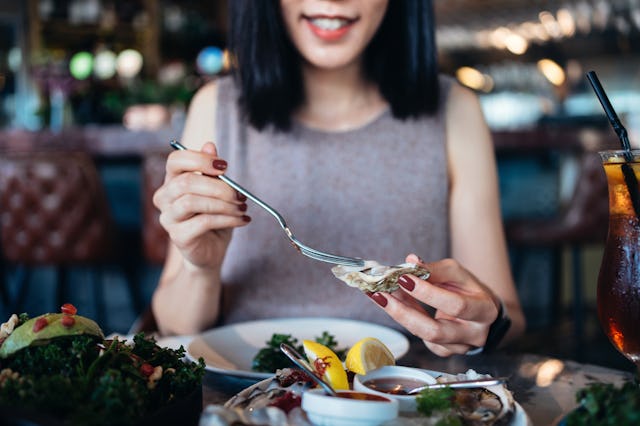Are Oysters Safe To Eat During Pregnancy?
What to know if your cravings include these briny mollusks.

Pregnancy cravings are so bizarre. One minute you're yearning for a pint of your favorite Ben & Jerry's ice cream, and an hour later, you'd do anything for steak and mashed potatoes. Perhaps you daydream of smashing down a juicy burger (or two). You may also have a hankering for foods you once hated. Despise the smell and taste of peanut butter? Well, now it's something you can't get enough of. Pregnancy cravings can even lead you to try new foods like fresh oysters, but then comes the age-old question: Can I even eat that while pregnant?
It's probably something you've been asking yourself a lot lately, and that's totally fair. Hey, figuring out what is and isn't safe to consume while pregnant is a journey. Researching what pain-relief treatments are OK during pregnancy is just as time-consuming — and just as important to both you and your baby's health!
Unfortunately, the answer to whether or not it's safe for pregnant people to eat oysters isn't black and white. On the bright side, the answer isn't a simple "no" either. Enjoying an occasional oyster while pregnant is doable, but only if prepared a certain way. Keep reading to learn why and how that is.
Can you eat oysters while pregnant?
Let's start with the good stuff: You can eat cooked oysters while pregnant. Huzzah! According to the FDA, pregnant people can safely enjoy eight to 12 ounces of low mercury seafood per week, including cooked oysters. Keyword? Cooked. The FDA even goes as far as to acknowledge cooked oysters as one of the "best choices" of seafood a person can eat while pregnant. (Cod, salmon, scallops, shrimp, and tilapia are other items on this list — all of which must be properly cooked prior to consumption.) Oysters promote the development of a baby's spinal cord, thanks to an essential nutrient called choline. Not to mention, shellfish is also packed with protein, different vitamins, and selenium.
As with several foods and beverages during pregnancy (coffee being a big one), moderation is key. In the case of oysters, preparation and method of cooking also prove crucial. Because of this, Mayo Clinic states pregnant people should not eat raw seafood, including raw oysters. Doing so can put you and your baby at risk of developing a potentially life-threatening infection, per Poison Control, due to the types of bacteria that shellfish encounter in the ocean.
Mayo Clinic also points out that consuming too much mercury while pregnant can "harm your baby's developing nervous system." Happily, oysters make the cut as one of the “best choices” you can make when it comes to seafood during pregnancy, as they contain little mercury. The 2020-2025 Dietary Guidelines for Americans suggest no more than two or three servings (8 to 12 ounces, or 224 to 336 grams) of “safe” seafood like oysters a week during pregnancy.
The one loophole, or more so takeaway in all of this, is that when shellfish is cooked correctly, bacteria dies. So, in theory, pregnant people can eat oysters. The oysters just have to be thoroughly cooked.
How do you properly cook oysters?
Oysters can be fried, broiled, baked, or boiled. It doesn't matter which method you choose as long as the oysters are — for lack of a better word — "well-done." When cooking raw seafood, always have a clean working space, and thoroughly wash your hands with warm water and soap before and after handling. If some of the oysters' shells have already cracked or opened, toss them. You wouldn't cook an egg if its shell was broken, would you?
You can tell when an oyster is cooked because its shell will open. Oysters that don't open after boiling in water for about 10 minutes should be discarded. If you decide to fry, broil, or bake fresh oysters, it's still a smart move to boil them for a few minutes first out of precaution. When in doubt, look up a recipe for step-by-step instructions.
Can you eat oysters while breastfeeding?
The answer is yes. You can totally eat oysters while breastfeeding. It's important to remember that bad oysters can lead to food poisoning or be filled with harmful bacteria. To avoid any issues, it's probably best to steer clear of raw oysters. If you do get an upset stomach from the food, it won't cause any issues for the baby you're breastfeeding.
How to tell if oysters are bad?
If you are going to eat oysters, it's important to ensure they are fresh. If the oyster is open, chuck it because it means it's dead or probably rotten. Also, look out for dry oysters because that's a sign that it's injured or dying. It's also important to pay attention to the smell. It should smell relatively the same as the time you bought it. Oysters usually stay fresh for about 14 days, but use your judgment.
Can you eat mussels while pregnant?
We know mussels aren't the same as oysters, but they're both parts of the mollusk family. So if oysters are safe, does this mean mussels are on the table too? The answer is yes. Mussels are filled with tons of nutrients perfect for a pregnant person, like protein, and omega-3 fatty acids, which are good for baby brain development. Just make sure the mussels are fresh and uncontaminated before eating.
This article was originally published on